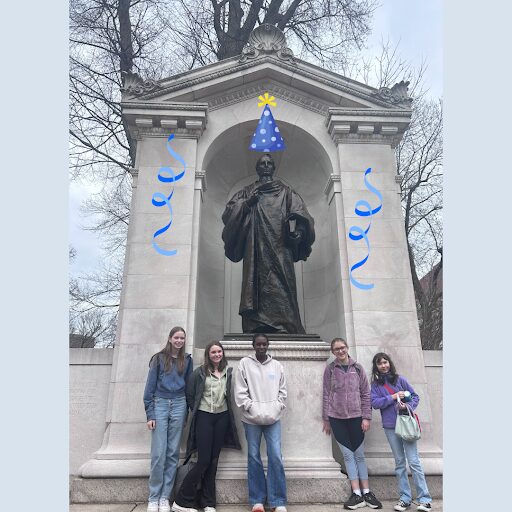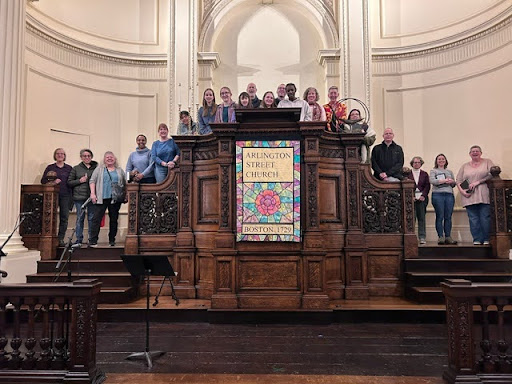by Robin Mitzcavitch, Director of Religious Exploration

This past Sunday was William Ellery Channing’s birthday, and it was also our Coming of Age class’s traditional pilgrimage to Boston for their self-led UU Boston History Tour.
Who is William Ellergy Channing and why do we care?
He was born April 7, 1780, Newport, Rhode Island —died October 2, 1842, Bennington, Vermont, U.S. He was an American author and moralist, a Congregationalist and, later, Unitarian clergyman. Known as the “apostle of Unitarianism,” Channing was a leading figure in the development of New England Transcendentalism and of organized attempts in the U.S. to eliminate slavery, drunkenness, poverty, and war.
Channing’s 1819 Sermon, “Unitarian Christianity,” brought Unitarianism out of the closet and helped Unitarianism emerge as a new religious tradition. In the sermon, he publicly affirmed what liberal Christians had been saying privately: He rejected Trinitarian dogma that made Christ equal to God and Calvinist creeds that demeaned the inherent worth and dignity of human nature.
Channing set aside the Calvinist image of God as wrathful, angry, and punitive, and rejected the portrayal of humans as irrevocably fallen, broken, and sinful. Channing insisted that God takes pleasure in making human beings happy and finds joy in encouraging the infinite progression of human beings toward the moral perfection of their souls.
Thanks in no small part to Channing, the affirmation of the worth and dignity of human nature became foundational for Unitarian faith. Human nature was now viewed as essentially sacred, perfectible, and moral. His essays, sermons, and discourses during the 19th century sold more than 100,000 copies in Europe and America. He gave the middle class a religion that affirmed what they personally experienced: progress, liberty, and the pursuit of happiness as a rational, sacred, and political right.
~Tapestry of Faith, What Moves Us, UUA
On Sunday, which was Channing’s 244th birthday, our group stood in the grand pulpit and read aloud his words, our voices ringing out in the historic sanctuary. We read:
The great end in religious instruction is not to stamp our minds upon the young, but to stir up their own;
Not to make them see with our eyes, but to look inquiringly and steadily with their own;
Not to give them a definite amount of knowledge, but to inspire a fervent love of truth;
Not to form and outward regularity, but to touch inward springs;
Not to bind them by ineradicable prejudices to our particular sect or peculiar notions,
But to prepare them for impartial, conscientious judging of whatever subjects may be offered to their decision;
Not to burden the memory, but to quicken and strengthen the power of thought;
Not to impose religion upon them in the form of arbitrary rules, but to awaken the conscience, the moral discernment.
In a word, the great end is to awaken the soul, to excite and cherish spiritual life.
~ William Ellery Channing
As we stood in the Arlington Street Church, we were surrounded by the beauty of the Tiffany stained glass windows, the largest collection of this work gathered together in the world. Each individual window told the story of Jesus’ life and the lessons of the “Beatitudes.” No windows depicted death or resurrection. This was not accidental. The Unitarians believed in the justice-minded teachings of Jesus’ life, and not in the Trinity, and the windows announce their religious focus in stunning color and craft.
I love our Coming of Age program for young teens. Along with adult mentors, we walk alongside these amazing young people, hoping to honor and hold up their individuality and inquiring minds, their emerging or changing beliefs, their spectacular individual truths. We have been offering Coming of Age at UUCW for over 20 years at least, definitely before my time here! And yes, the program has evolved over the years to meet changing needs.
We work together, knowing that over the course of our lives, these truths may change, and thus we began to offer Coming of Age -Again for adults. This is our second year offering this small group experience to adult journeyers. As we enter new phases during our lifetime, we “come of age” again and again. To look at this reality as an adult and to talk about it, is a poignant learning experience for many, including myself, as I facilitate both of these classes.
Please join us this Sunday, April 14th at 10am as we graduate and celebrate our current adult COA-A members, and then on Sunday, May 12th as we graduate and celebrate our teen members. These are joyous moments where we can support folks in our community as they enter different phases and ways of knowing in their lives. Rituals which unite and support people of all ages within our church, are our affirmation of worth and dignity within these walls. This is a most special gift of interdependence.

All together now,
Robin Mitzcavitch
